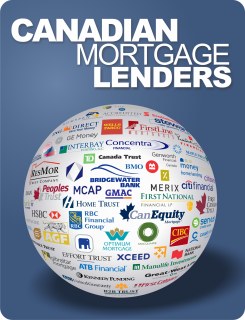Mortgage Basics: Types of lenders
Posted by Steve Harmer on Tuesday, September 27th, 2016 at 9:52am.
 You have many choices when it comes time to get your mortgage.
You have many choices when it comes time to get your mortgage.
Not only do the different types, terms, and options for the mortgage vary, but you also have options when it comes to choosing the lender for your home loan. It’s important that your lender offers you a competitive rate, but there are other things to take into consideration, such as flexibility, customer service, and the fact that not all lenders offer all types of mortgages.
Banks
The biggest players in the mortgage market by far are the commercial banks. Big banks provide the majority of home loans to consumers. The general public knows and recognizes their brands, and there’s also some brand loyalty for consumers who already make use of the bank’s other financial products. These financial institutions advertise their products and mortgage rates in traditional media outlets, such as television and print, as well as inside their bank branches, where you are encouraged to “ask about flexible mortgage features.” Big banks have been seen as a good lending option over the years because they were stable, well-known, and borrowers had the potential to get a better rate if they were already a customer with that lender (although that last benefit seems to be becoming a thing of the past). Getting a mortgage with a bank is one of the easiest options out there because bank branches are everywhere and it’s easy for anyone to walk in and speak with a mortgage professional at any time. Another advantage to getting a mortgage from a bank is that you have the ability to combine all of your finances – credit card, loans, investments, whatever accounts you hold with that bank – under one umbrella, adding the mortgage to your existing client profile and theoretically making all of these accounts work well together. Banks are, however, a somewhat limited option in that they can only offer you their rates for their mortgages. It’s not like price-matching, where you can bring a competitor’s flyer advertising a lower price into a store, which will  then honour the lower price. The bank’s options are the bank’s options; you can take them or leave them.
then honour the lower price. The bank’s options are the bank’s options; you can take them or leave them.
Credit Unions
Compared to banks, credit unions provide a relatively small percentage of Canadian mortgages. Credit unions fill in some of the cracks left by the big banks, particularly in small, rural communities. Each credit union is autonomous and they operate as cooperatives, which means that they’re owned by their members as opposed to shareholders. They are regulated by the province as opposed to the federal government and they are for-profit entities, although the profits are reinvested into their individual communities. Generally speaking, they are known for their good customer service and flexibility to tailor your mortgage to you,  although their mortgage products may be fairly limited and without many of the features offered by other lenders. Traditionally credit unions offered much higher home loan rates than the commercial banks, although that’s changed in recent years and the interest rates offered by credit unions are much more competitive. One of the challenges for credit unions when it comes to mortgages is that because they operate on a local level, most don’t have a national identity, nor do they have the big budgets to advertise to a wide audience. Because of this, many consumers don’t know that credit unions exist, and this option may fly under the radar when it comes time to get a mortgage.
although their mortgage products may be fairly limited and without many of the features offered by other lenders. Traditionally credit unions offered much higher home loan rates than the commercial banks, although that’s changed in recent years and the interest rates offered by credit unions are much more competitive. One of the challenges for credit unions when it comes to mortgages is that because they operate on a local level, most don’t have a national identity, nor do they have the big budgets to advertise to a wide audience. Because of this, many consumers don’t know that credit unions exist, and this option may fly under the radar when it comes time to get a mortgage.
Monoline Lenders
Unlike banks, which dabble in everything from everyday banking to financial investments to auto insurance, monoline lenders only offer mortgages, which means that you won’t apply for a mortgage and get offered a mortgage plus a credit card. Monoline lenders are fairly mainstream, although they hold a much smaller share of the market than big banks. Monolines don’t deal directly with consumers, so in order to access a monoline lender, you have to go through a mortgage broker. Monolines tend to be smaller outfits, generally without bricks and mortar locations that drive up overhead costs. One of the benefits of getting a mortgage with a monoline lender is that they can offer interest rates that are more competitive than those held by the big banks. They are still considered an A-lender so are suitable for optimal borrowers who have stable income and good credit, but they tend to be a little more flexible with it comes to borrowers in alternative income situations. Monolines can also be a little more flexible when it comes to penalties, prepayment options, and other issues that may arise over the life of a mortgage, whereas big banks are notorious for high prepayment penalties.
Monoline lenders follow the same rules and regulations as the big banks and the mortgage approval process can be relatively quick. In spite of these benefits, monoline lenders make up less than a quarter of the mortgage market, perhaps because some borrowers are uncomfortable with the biggest loan of their life being held by a company they’ve never heard of and that doesn’t have a physical location. Still, monolines are an important player in the industry because they offer consumers more choice when it comes to getting a mortgage, making it unnecessary to rely solely on the big banks.
Private lenders
Private lending companies are those that offer short-term loans funded by money pooled from individual investors or groups of investors. These mortgages can be approved quickly, without jumping through as many hoops as necessary with other lenders. Mortgages obtained through private lending companies are attractive to people who may present as high-risk borrowers on paper because they have poor credit history or otherwise can’t meet the standards of more traditional lenders. Private mortgages are also attractive to property investors for a number to reasons. One reason is that the law requires a 20% down payment for non-owner-occupied properties, and many property investors don’t have that kind of cash upfront. Another reason is that an investor may have multiple properties in their portfolio, which is frowned upon by bigger lenders, therefore making it harder to get a more traditional mortgage. Private mortgages carry higher than average interest rates, but since they’re interest-only loans where payments don’t go toward the principal, the monthly payments are lower – ideal for an investor who plans to resell a property for a profit within a short period of time. Private mortgages are also an option for people who need bridge financing, a loan for the period in between one mortgage and another. Bridge financing is used in many occasions when a buyer has sold one home but hasn’t yet bought another.
The idea with these loans is that borrowers using a private lender for a mortgage plan to have more income and/or improve their credit by the end of the loan term, at which point they hope to obtain a more traditional mortgage. Although there are standard practices among private lenders, they are much more loosely regulated than other lenders.
Private mortgages aren’t eligible for mortgage insurance, so if the borrower defaults on the mortgage, then the private lender is on the hook for the property. Because of this, private lenders are interested in the particular property and the value of the surrounding area just as much as or even more so than the credentials of the individual borrower. The lender wants to know that they can sell the property quickly and recoup their money if need be. In addition to higher interest rates, there are fees associated with private mortgages, such as lender fees, mortgage broker fees, legal fees and an appraisal. Private mortgages can become a costly option for borrowers if not managed wisely.
© http://www.whichmortgage.ca/article/mortgage-basics-types-of-lenders-213259.aspx

